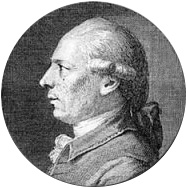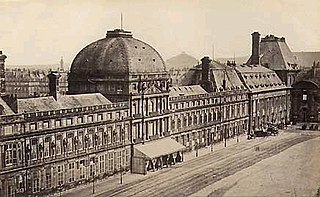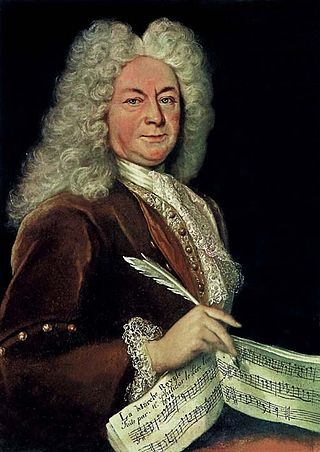Related Research Articles

François-André Danican Philidor, often referred to as André Danican Philidor during his lifetime, was a French composer and chess player. He contributed to the early development of the opéra comique. He is widely regarded as the best chess player of his age; his book Analyse du jeu des Échecs was considered a standard chess manual for at least a century. A well-known chess opening, an endgame position, and a checkmate method are all named after him.

Michel Richard Delalande [de Lalande] was a French Baroque composer and organist who was in the service of King Louis XIV. He was one of the most important composers of grands motets. He also wrote orchestral suites known as Simphonies pour les Soupers du Roy and ballets.
François Antoine de Legall de Kermeur (1702–92) was a French chess player, and was possibly the world's best player from about 1730 to 1755.
The year 1688 in music involved some significant events.
The year 1687 in music involved some significant events.

The Concert Spirituel was one of the first public concert series in existence. The concerts began in Paris in 1725 and ended in 1790. Later, concerts or series of concerts with the same name occurred in multiple places including Paris, Vienna, London and more. The series was founded to provide entertainment during the Easter fortnight and on religious holidays when the other spectacles were closed. The programs featured a mixture of sacred choral works and virtuosic instrumental pieces, and for many years took place in a magnificently-decorated Salle des Cent Suisses in the Tuileries Palace. They started at six o’clock in the evening and were primarily attended by well-to-do bourgeois, the lower aristocracy, and foreign visitors. In 1784 the concerts were moved to the stage area of the Salle des Machines, and in 1790, when the royal family was confined in the Tuileries, they took place in a Paris theater.
André Danican Philidor may refer to:
Anne Danican Philidor was a French woodwind player and composer of the Philidor family. Born in Paris on 11 April 1681, his grandfather and father were also professional woodwind players in the king's service. Anne was named for his godfather Anne Jules de Noailles. His composition "L'Amour vainqueur" was given a court performance in 1697, financially backed by his godfather. 1702 saw him succeed his father in the king's orchestra, primarily as oboist. In addition to his playing duties he was the king's musical librarian. He assembled several hundred portfolios of music, both instrumental and operatic, several of which are well-preserved in French libraries. Anne is best remembered today for having founded the Concert Spirituel, an important series of public concerts held in the palace of the Tuileries from 1725 to 1791.

Tom Jones is a comédie mêlée d'ariettes, a kind of opéra comique, by the French composer and chess champion François-André Danican Philidor which first appeared at the Comédie-Italienne, Paris, on 27 February 1765. Its French libretto, by Antoine-Alexandre-Henri Poisenet and Bertin Davesne, is loosely based on the 1749 novel by Henry Fielding.

Joseph-François Garnier was a French oboist and composer.

Blaise le savetier is a 1759 one-act opéra comique, by the French composer François-André Danican Philidor. The libretto was by Michel-Jean Sedaine, after a story by Jean de La Fontaine entitled Conte d'une chose arrivée à Château-Thierry.
The chapelle royale was the musical establishment attached to the royal chapel of the French kings. The term may also be applied to the chapel buildings, the Chapelle royale de Versailles.
Jean Danican (D'Anican) Philidor was a court musician at Versailles during the reign of Louis XIII, and a member of the prestigious Philidor family. The name Philidor was conferred upon Jean's elder brother, Michel Danican, by Louis XIII, when his oboe playing reminded the monarch of the Italian virtuoso oboe player, Filidori of Siena; however, Michel never formally adopted the surname. Jean is the first individual to be found documented as "Danican dit Filidor", and evidence implies that he assumed the name at the time of his brother's death, in 1659.

André Danican Philidor the elder [French: l'aîné], a member of the Philidorit family of French musicians and referred to as André Danican Philidor le père after 1709, was a music librarian, instrumentalist, and composer. He is chiefly known as the organizer and principal copyist of what is now known as the Philidor Collection of French Baroque manuscript scores.
Events from the year 1726 in France.

Louis-Barthélémy Pradher was a French composer, pianist and music educator.

Louis-Augustin Richer was a French singer, singing professor and composer. He was a member of a family of musicians from Versailles who also had close ties to the family of André Danican Philidor. He gained prominence as a singer at the courts of Louis XV and Louis XVI and also served as Maître de musique for the courts of the Duke of Chartres and the Duke of Bourbon. After the abolition of the monarchy during the French Revolution, Richer became a professor at the Paris Conservatory.
References
- Rebecca Harris-Warrick and Julian Rushton. "Philidor." In Grove Music Online .